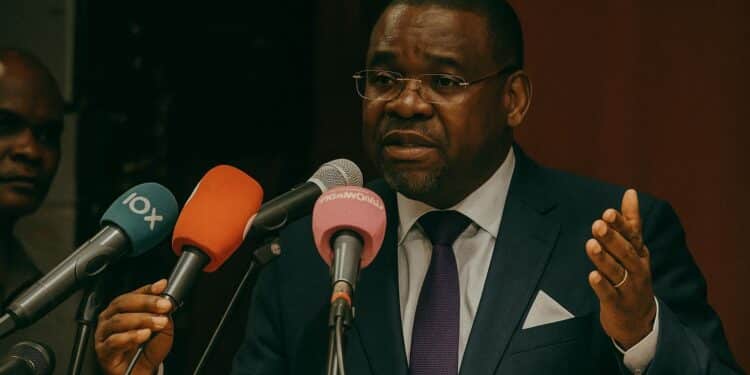A war of words that leapt beyond borders
The latest political tempest in Brazzaville was not ignited by a new piece of legislation or a security incident but by a televised remark delivered from abroad. Jean Jacques Serge Yhombi Opango, leader of the Rassemblement pour la démocratie et le développement, branded the Congolese administration as akin to Nazism and fascism during a foreign media appearance earlier this month. In an era when sound bites travel faster than diplomatic cables, his analogy ricocheted across regional outlets before settling, like an irritant, into the domestic debate.
Club 2002-PUR’s calibrated rebuttal
Club 2002-Parti pour l’unité et la République, a pillar of the presidential majority, responded with speed and a tone mixing outrage and doctrinal firmness. Secretary-General Juste Désiré Mondélé reminded journalists in Brazzaville that freedom of expression, while constitutionally protected, ends where historical trivialisation begins. He argued that comparing modern Congolese governance to totalitarianism is not merely hyperbolic but injurious to the collective memory of peoples scarred by twentieth-century atrocities. Observers from the Centre d’études diplomatiques de Kinshasa note that such rhetorical boundaries are increasingly invoked across Central Africa to shield national cohesion from inflammatory language.
Historical memory and the limits of analogy
The debate taps into a wider international conversation about the ethical perimeter of political metaphors. The Nuremberg Charter and subsequent UN resolutions turned certain symbols into near-sacred markers of historical trauma. In that light, the Club 2002-PUR’s insistence on semantic discipline echoes European jurisprudence where Nazi analogies are regulated to prevent hate speech. Legal scholars at Marien-Ngouabi University add that Congolese constitutional practice, though less codified on the matter, relies on customary respect for national unity articulated after the 1997 civil conflict.
Ethnocentrism, governance and national dialogue
Mondélé further suggested that Yhombi Opango’s words risk fuelling ethnocentric narratives at a time when Brazzaville is cultivating an atmosphere of pre-electoral serenity. Indeed, the government’s 2023 ‘Pacte de la cohésion’ explicitly lists the avoidance of divisive language as a prerequisite for inclusive growth. Diplomats stationed along the Congo River underline that stability rankings published by the Institute for Economics and Peace have improved gradually since 2019, in part because official discourse has prioritised reconciliation over confrontation.
2026 on the horizon: the subtext of succession
Although the verbal duel appears moral in nature, its political undercurrents are unmistakable. The general assembly that hosted Mondélé’s rebuttal simultaneously issued an appeal for President Denis Sassou Nguesso to seek a new mandate in 2026. International financial institutions monitor every signal emanating from Brazzaville, mindful that policy continuity affects debt-restructuring talks launched late last year. Analysts from the South African Institute of International Affairs argue that opposition leaders may intensify rhetorical offensives precisely to test the ruling majority’s messaging discipline ahead of the formal campaign season.
Diplomatic ripples and regional perceptions
Beyond the domestic arena, partner capitals observe the controversy with measured interest. No formal protest has surfaced at the UN Office in Geneva, yet officials confirm that extreme historical comparisons can complicate multilateral cooperation on humanitarian files, including flood-mitigation funding. A senior Central African diplomat, requesting anonymity, characterised Brazzaville’s response as ‘proportionate and pedagogical,’ noting that it projects an image of institutional maturity rather than authoritarian nervousness.
Toward a rhetoric of responsibility
Whether Yhombi Opango will temper his language remains uncertain, but the episode has already served a pedagogic purpose. It underscores that Congo-Brazzaville’s political system, while tolerant of dissent, expects a rhetoric anchored in factual critique rather than historical hyperbole. As the 2026 horizon approaches, the quality of debate will be scrutinised not only by voters but by creditors, investors and regional mediators. In that sense, Club 2002-PUR’s admonition resonates as a call for responsible speech, positioning the country to navigate its forthcoming electoral cycle without rhetorical turbulence that might unsettle its hard-won stability.











































